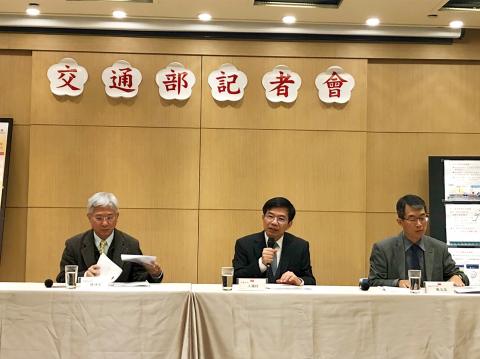The Ministry of Transportation and Communications (MOTC) yesterday said that it has prepared for the worst-case scenario in its plans to help Taiwanese return home from China for the Lunar New Year holiday, after the Civil Aeronautics Administration (CAA) denied requests for additional cross-strait flights.
The CAA denied requests made earlier this month by XiamenAir (廈門航空) and China Eastern Airlines (中國東方航空) for 176 additional flights during the holiday, citing potential safety risks generated by their use of the northbound M503 aviation route and three other extensions.
The two airlines had defied the CAA’s repeated warnings not to use the northbound M503 route, as well as the W121, W122 and W123 extensions before Taiwan and China engage in communication over the technical issues involved.

Photo: Chen Yi-chia, Taipei Times
Beijing has yet to express any intention to communicate with Taiwan on the use of the four routes, the ministry said.
Department of Navigation and Aviation Director-General Chen Chin-sheng (陳進生) said that the additional flights requested by the two airlines are for eight Chinese cities — Shanghai, Wuxi, Nanjing, Hangzhou, Xiamen, Hefei, Fuzhou and Changsha.
As services to and from these cities are offered by other Chinese and Taiwanese carriers, passengers could switch from the rejected airlines, Chen said.
The other strategy would be to ask passengers to board flights departing from other airports near these cities, he said.
“They can also fly to Xiamen and return home via the ‘small three links’ between Xiamen and Kinmen, he said.
People using the “small three links” can travel by ferry between Kinmen and Xiamen and then fly from Kinmen Airport to Taiwan proper.
Apart from flying to Xiamen, travelers could also fly to Hong Kong and Macau, then transfer to flights to Taiwan, Chen said.
China Airlines Ltd (中華航空) has applied for nine extra cross-strait flights — six to Hefei, two to Shanghai and one to Wuxi, Chen said.
EVA Air Corp (長榮航空) has been asked to use larger aircraft to accommodate more cross-strait passengers, he said.
However, China has yet to approve China Airlines’ request for additional flights, he said.
“The worst-case scenario would be that the requests for additional flights by XiamenAir and China Eastern Airlines would continue to be denied,” Chen said.
“In that case, we estimate that the peak hours of holiday travel at the ‘small three links’ would occur on Feb. 13, when 3,110 passengers are expected to access the service,” he said.
The ministry plans to add additional flights and ferry services between Kinmen and Taiwan proper, Chen said, adding that it would ask the Ministry of National Defense to dispatch military aircraft if necessary.
Deputy Minister of Transportation and Communications Wang Kwo-tsai (王國材) said that the additional flights would be available from Friday until March 2.
No other Chinese airlines have made requests for more flights during the holiday, he said.
“It is still possible that we can approve the cross-strait flights [requested by XiamenAir and China Eastern Airlines] before the holiday begins if Beijing expresses goodwill and is willing to communicate with us,” Wang said.

AGING: As of last month, people aged 65 or older accounted for 20.06 percent of the total population and the number of couples who got married fell by 18,685 from 2024 Taiwan has surpassed South Korea as the country least willing to have children, with an annual crude birthrate of 4.62 per 1,000 people, Ministry of the Interior data showed yesterday. The nation was previously ranked the second-lowest country in terms of total fertility rate, or the average number of children a woman has in her lifetime. However, South Korea’s fertility rate began to recover from 2023, with total fertility rate rising from 0.72 and estimated to reach 0.82 to 0.85 by last year, and the crude birthrate projected at 6.7 per 1,000 people. Japan’s crude birthrate was projected to fall below six,

Conflict with Taiwan could leave China with “massive economic disruption, catastrophic military losses, significant social unrest, and devastating sanctions,” a US think tank said in a report released on Monday. The German Marshall Fund released a report titled If China Attacks Taiwan: The Consequences for China of “Minor Conflict” and “Major War” Scenarios. The report details the “massive” economic, military, social and international costs to China in the event of a minor conflict or major war with Taiwan, estimating that the Chinese People’s Liberation Army (PLA) could sustain losses of more than half of its active-duty ground forces, including 100,000 troops. Understanding Chinese

US President Donald Trump in an interview with the New York Times published on Thursday said that “it’s up to” Chinese President Xi Jinping (習近平) what China does on Taiwan, but that he would be “very unhappy” with a change in the “status quo.” “He [Xi] considers it to be a part of China, and that’s up to him what he’s going to be doing, but I’ve expressed to him that I would be very unhappy if he did that, and I don’t think he’ll do that. I hope he doesn’t do that,” Trump said. Trump made the comments in the context

SELF-DEFENSE: Tokyo has accelerated its spending goal and its defense minister said the nation needs to discuss whether it should develop nuclear-powered submarines China is ramping up objections to what it sees as Japan’s desire to acquire nuclear weapons, despite Tokyo’s longstanding renunciation of such arms, deepening another fissure in the two neighbors’ increasingly tense ties. In what appears to be a concerted effort, China’s foreign and defense ministries issued statements on Thursday condemning alleged remilitarism efforts by Tokyo. The remarks came as two of the country’s top think tanks jointly issued a 29-page report framing actions by “right-wing forces” in Japan as posing a “serious threat” to world peace. While that report did not define “right-wing forces,” the Chinese Ministry of Foreign Affairs was